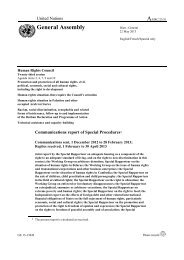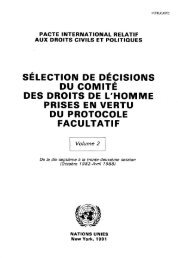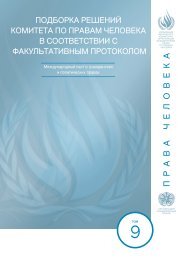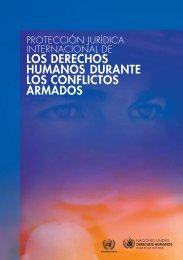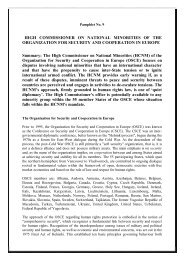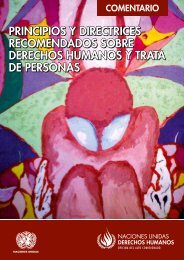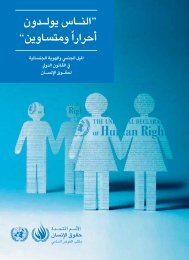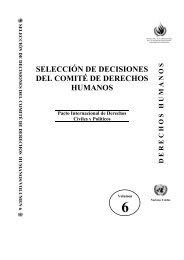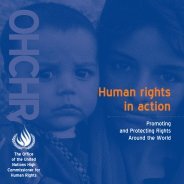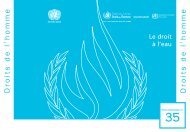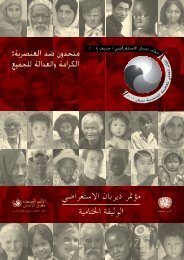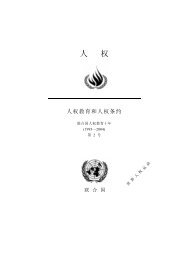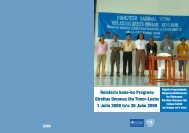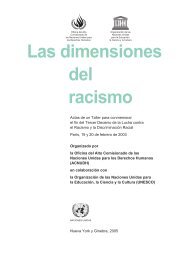good governance practices for the protection of human rights
good governance practices for the protection of human rights
good governance practices for the protection of human rights
Create successful ePaper yourself
Turn your PDF publications into a flip-book with our unique Google optimized e-Paper software.
ness <strong>of</strong> <strong>the</strong> <strong>human</strong> <strong>rights</strong> violations under <strong>the</strong> dictatorship. A number <strong>of</strong> events<br />
contributed to this progress, including <strong>the</strong> increase in <strong>the</strong> number <strong>of</strong> court cases<br />
relating to <strong>human</strong> <strong>rights</strong>, <strong>the</strong> search <strong>for</strong> disappeared detainees and <strong>the</strong> discovery<br />
<strong>of</strong> remains, <strong>the</strong> organization and mobilization <strong>of</strong> persons who were detained,<br />
tortured or exiled, and <strong>the</strong> promulgation <strong>of</strong> legislation concerning <strong>of</strong>ficials who<br />
had been removed from <strong>of</strong>fice.<br />
In addition to <strong>of</strong>fering medical care, PRAIS has provided a <strong>for</strong>um <strong>for</strong> people to<br />
ga<strong>the</strong>r and to acknowledge <strong>the</strong>ir common condition as victims <strong>of</strong> State repression.<br />
It has helped beneficiaries to acknowledge <strong>the</strong>ir suffering and enabled <strong>the</strong>m<br />
to face <strong>the</strong> demands <strong>of</strong> <strong>the</strong>ir present lives.<br />
Impact on <strong>human</strong> <strong>rights</strong> and challenges<br />
PRAIS enabled Chile’s medical system to implement <strong>the</strong> right <strong>of</strong> victims <strong>of</strong> repression<br />
to redress, by injecting medical expertise relevant to <strong>the</strong> needs <strong>of</strong> victims in<br />
<strong>the</strong> health-care system and funds allowing <strong>for</strong> free access to health care <strong>for</strong> many<br />
impoverished and underprivileged victims.<br />
The Programme’s impact has been manifold. First, it has delivered valuable mental<br />
as well as physical health services to thousands <strong>of</strong> victims. Second, it has<br />
helped its beneficiaries to create a collective memory and made possible <strong>the</strong><br />
recovery <strong>of</strong> a part <strong>of</strong> history. Third, by specifically addressing <strong>the</strong> needs <strong>of</strong> victims<br />
<strong>of</strong> State repression and violence, it has contributed to <strong>the</strong> recognition <strong>of</strong> <strong>the</strong> victims’<br />
status. This was extremely significant given that this recognition was delayed<br />
owing to <strong>the</strong> lengthy national debate on <strong>the</strong> repression and violence under <strong>the</strong><br />
previous regime which occurred in <strong>the</strong> context <strong>of</strong> <strong>the</strong> transition to democracy.<br />
Fourth, PRAIS and <strong>the</strong> Ministry <strong>of</strong> Health have accumulated extensive expertise<br />
and developed technical standards regarding <strong>the</strong> care <strong>of</strong> persons affected by political<br />
repression, which may be referred to by future providers.<br />
Owing to poor funding, <strong>the</strong> Programme’s key challenge is sustainability. As a<br />
result <strong>of</strong> <strong>the</strong> large increase in <strong>the</strong> number <strong>of</strong> beneficiaries, <strong>the</strong> health-care sector<br />
has come under strain. Fur<strong>the</strong>rmore, <strong>the</strong> Programme faces <strong>the</strong> continuous challenge<br />
<strong>of</strong> providing specialized assistance tailored to <strong>the</strong> needs <strong>of</strong> different victims<br />
in a national health-care system that suffers several shortcomings.<br />
Finally, and importantly, PRAIS was challenged <strong>for</strong> several years by <strong>the</strong> lack <strong>of</strong><br />
<strong>of</strong>ficial and public recognition <strong>of</strong> <strong>the</strong> victims by <strong>the</strong> State. This was finally addressed<br />
by <strong>the</strong> publication <strong>of</strong> <strong>the</strong> report <strong>of</strong> <strong>the</strong> National Commission on Political<br />
Imprisonment and Torture in 2004.<br />
D. A bill <strong>of</strong> <strong>rights</strong> to streng<strong>the</strong>n <strong>human</strong> <strong>rights</strong> in legislation<br />
and policy – Australia<br />
Issue<br />
Several Australian federal, territory and State governments have, over <strong>the</strong> years,<br />
debated <strong>the</strong> question <strong>of</strong> a bill <strong>of</strong> <strong>rights</strong>. Supporters <strong>of</strong> such a bill pointed out <strong>the</strong><br />
53



